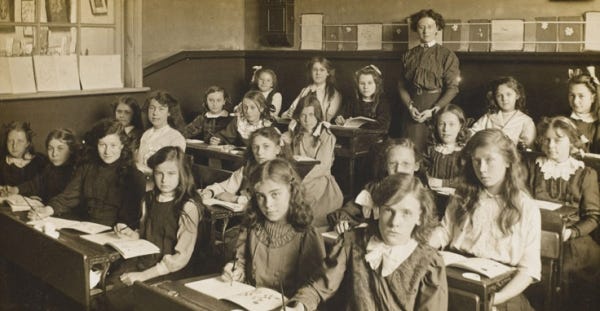Teachers Blame Violent Games For, Um, Everything
The Blame Game, Rated 18
Like the return of the tides, so it must be that every so often a body calls for better regulation, tighter legislation, or the outright banning of violent video games. While we absolutely agree that children should not be playing adult-rated games, there's no peer-reviewed evidence for a long-term, significant negative effect on young people from playing violent games (and that's despite so very many organisations funding research that would prove it), but once more the press is bursting with scare stories over the indelicate subject. This time it's UK teachers claiming younger class members are having their behaviour and health influenced by games. Are there new findings we should be taking notice of to support these claims? Guess. And there's a reason why this is more serious than our rolling our eyes at yet another scare story. There is potentially great harm to be caused by this. Below I argue why.
Of course what's actually happening is one person, Alison Sherratt (primary teacher, and junior vice president of the ATL), is giving speech at a conference for the Association Of Teachers And Lecturers. That's happening today, and clearly there has been a PR machine in full whirr, ensuring that we all know about it in advance. This is building up to the ATL's plan to call for further research into the subject, which is obviously a good thing. Sadly, they seem to have already made up their minds in advance of that.
It is claimed that there is a rise in "hitting, hurting and thumping" in the school playground, and this it seems is being attributed to the unregulated access for primary school children to games designed for adults. The teacher, Mrs Sherratt, then will add, according to the Telegraph, that children are "growing up desensitised to aggression and bloodshed."
Unfortunately, rather than Mrs Sherratt's talk being based on studies demonstrating these trends, they are instead her anecdotal observations of her own classroom, making her claims about as helpful as declaring porridge to be to blame. Rather than citing evidence that shows a growing level of violence in primary schools - something that we should all sit up and take notice of, obviously - instead it's just something she's "noticed". There's a "lot more hitting, hurting, thumping etc in the classroom for no particular reason." Well, if it's more than there was in my classrooms in 1982, then it must be all out warfare right now, kids turning up with semi-automatics and hand grenades.
A "small scale survey" has taken place, however. Er, in Sherratt's school. This showed that "almost all" pupils had TVs with PCs and consoles in their bedrooms. But unfortunately, at least with what's been revealed of her speech so far, this didn't seem to ask whether they were using them to play anything violent. Small matter. So instead the concerned teacher screeches her handbrake and veers into, "I would suggest that if children are taking part in this fairly solitary existence this will impact on their speaking and listening skills which, in turn, will impact on their ability to concentrate and learn in school." Which has exactly what to do with anything about violence in the classroom?
RPS is extremely concerned about any possible negative effect of violent gaming on children. Of course we don't believe that games have impunity because we happen to enjoy them, and we fully support and endorse the age ratings the games come with. Clearly parents should respect those, and children shouldn't be playing games deemed suitable only for adults. We want them protected from seeing content that might upset or disturb them, and we want our games protected from being accessed by children so we can continue to enjoy adult content. But there can be no room whatsoever for such anecdotal and entirely unevidenced claims being presented in a major conference. It's unacceptable.
But unfortunately this seems to be more about blame. Blame for all the ills in a child's life. Sherratt's speech contains the following:
"Obesity, social exclusion, loneliness, physical fitness, sedentary solitary lives - these are all descriptions of children who are already hooked to games ... Sadly there is a notable correlation between the children who admit to playing games and those who come to school really tired."
Just about everything imaginable is wrong with that. Negative features of childhood that have existed for centuries longer than gaming, the implication that they're 'addicted' to gaming, and obfuscation of correlation and causation, without any meaningful evidence for even the correlation. It's unhelpful, it's poorly educated, and worst of all, randomly blaming the bogeyman du jour means ignoring all the multifactorial causes of that long list of symptoms. By dumping everything on gaming, the real reasons a child may be lonely, excluded, or unwell goes unrecognised, and that child goes unhelped, and that's why we get so utterly furious at this sort of empty, scaremongering rhetoric.
I say this every time, and it's always worth repeating: If games are genuinely harmful to children, and to adults, and if playing violent video games has a long-term negative consequence, then we want to know about it. It is of primary concern to us. But when piles of evidence from multiple studies over many years have shown only short-term, extremely minor aggression level changes (still something that absolutely merits our attention, clearly), and nothing has been shown that supports the claims being made to this conference, and indeed any number of other public-facing declarations of doom and danger, it only makes it more likely that the truth will go unheard, potentially endangering those likely to be negatively impacted. Playing this short-sighted, and frankly, incredibly lazy blame game ensures the multitude of factors that lead to a child's unhappiness are undiagnosed, and that's perhaps the sort of thing a union of teachers should be caring about. Maybe?











